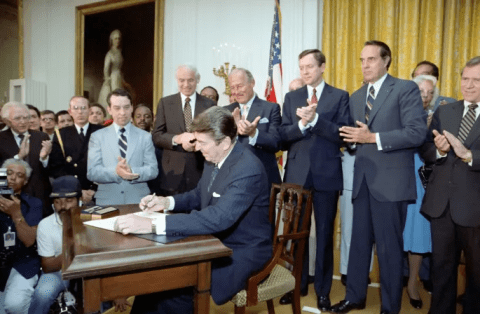
The new Congress of 1982 found itself considering the provisions of the Voting Rights Act as they neared expiration. A series of hearings were held featuring more witness testimonies; the majority of the 100+ witnesses supported extending the provisions by a decade. In contrast to the previous amendments of 1970 and 1975, the Reagan Administration withheld an official position regarding the proposed extensions. After legislation was passed and slowed in both chambers of Congress, the Reagan Administration finally made an official position, calling for an extension of the provisions for 10 years. In turn, the Senate agreed to shorten the time for a state or local government to be excused from the coverage formula from 17 years to 10.
Of the many considered provisions, Section 2 – which prohibited discriminatory voting laws – was the most hotly debated. The Supreme Court decision Mobile v. Bolden in 1980 determined that a discriminatory law could only be considered as such if the law was purposefully meant to be discriminatory, rather than having an effect that was discriminatory. For civil liberties groups, this decision made attempts to expose voter discrimination far more difficult than it otherwise would have been. In response, the Congressional debates over the new provisions led to the creation of a “results” test, designed to prohibit laws that had a discriminatory effect, regardless of the intention or lack thereof. The Reagan Administration objected to the test at first, with the President himself being concerned that the long-term impact of it could compromise the electoral process. In light of concerns in Congress that the “results” test would necessitate proportional representation to remedy incidents of discrimination, more legislation was drafted that specifically mentioned that proportional representation would not be necessary, and as such would not be used at all. This addition earned the support of the Democrats, Republicans, and the Reagan Administration for extending the provisions. After passing through both chambers of Congress, Reagan signed the Voting Rights Act Amendments of 1982 into law on June 29.